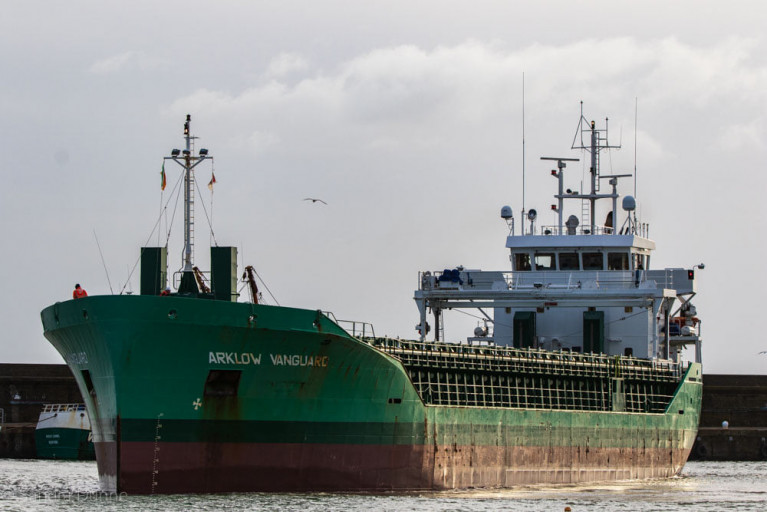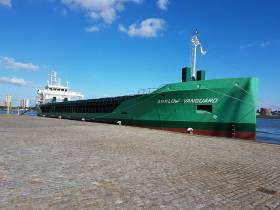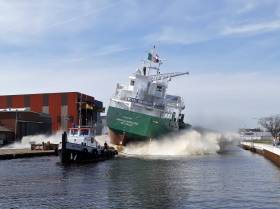Displaying items by tag: Arklow Vanguard
Before signing off for Afloat's report on RV Celtic Voyager's Dun Laoghaire call and bad weather forecast for Wicklow Head, this led to tracking an Arklow Shipping cargoship on a rare call bound to the nearby port, writes Jehan Ashmore.
The Arklow Vanguard had anchored overnight off Wicklow Head having sailed across the Celtic Sea from Avonmouth Docks (see: story), one of the two Bristol Port Co. ports. The other is Royal Portbury Docks on the opposite bank of the River Avon.
This morning the Royal Bodewes built Arklow Vanguard (2017/2,999grt) berthed alongside the Packet Quay, where the berth is the most used by commercial shipping in Wicklow Port. The cargoship was in ballast to load recyclable metals.
Arklow Vanguard's 'maiden' call to the east coast Irish Port is the first Arklow Shipping cargoship in almost a decade to Wicklow when Afloat reported on previous coaster's call to load scrap metal.
On that occasion in June, 2011, the Irish flagged Arklow Rebel (exactly same tonnage) of today's 'V' class though at 86.93m long is slightly shorter compared to the 'R' class (89.99m) dating to 2005.
Arklow Vanguard is the first to carry this name for ASL, albeit this particular cargoship is managed by their Dutch arm, Arklow Shipping Nederland B.V.
Among other vessels in port are AMS Retreiver and Husky, both belonging to Wicklow based Alphamarine and otherwise previously known as Island Shipping.
#50ships - The maiden delivery voyage of Arklow Vanguard is significant as Arklow Shipping now totals a record 50 cargoships and follows the company's 50th anniverary last year, writes Jehan Ashmore.
Arklow Vanguard made the delivery passage on Monday from Delfzijl to Rotterdam, where the 87m newbuild has as a port of registry. This is because the Dutch subsidiary, Arklow Shipping Nederland B.V. are located in the giant port. They are responsible in managing 19 cargoships.
The balance of 31 cargoships are under the Irish flag and registered in the owner’s homeport of Arklow, Co. Wicklow. The headoffice of Arklow Shipping Ltd overlooks the River Avoca from where chartering teams are based and that of the Rotterdam office. To put into context they operate the mixed flagged fleet that range from the 4,900dwt ‘R’ class short-sea traders to a pair of 34,900dwt ‘S’ class sisters that trade worldwide. These cargoships are employed to carry project cargoes, grain, generals and bulk commodities including those classified under IMO regulations.
Arklow Vanguard has a 5,150dwt and is a Royal Bodewes Eco-Trader built to that yard’s own design that features a straight-stem bow design. This reduces wave resistance and so saves on fuel consumption. Also a stream-lined hull form adds to greater efficiencies.
As previously reported, launching of Arklow Vanguard took place in late March in Hoogezand near Groningen. The newbuild brings to five so far delivered out of a total of 10 Eco-Traders or ‘V’ class short-sea dry cargoships. Among, the typical cargoes to be transported will be grain, animal feed and steel rails.
Vanguard's Lunchtime Launch for Arklow's Dutch Operations
#LunchLaunch - The final day of March marked the launch of yet another newbuild as part of an ongoing modernisation programme of the Arklow Shipping fleet, writes Jehan Ashmore.
Arklow Vanguard (yard no. 726) was given a lunchtime launch under glorious conditions. Turning out to see the spectacle were locals that were invited by the Dutch yard in Hoogezand. The 5,150dwat Bodewes Trader was given the customary sideways launch followed by wave splash that just added to the occasion.
The shipyard, Royal Bodewes has so far completed five of the ships under the ‘V’ naming series that began with launch of leadship Arklow Vale in 2015 (see video). With the launch of Arklow Vanguard, this marks the second half-way point as a total of 10 such cargoships are on order. They are to serve Arklow Shipping Nederland B.V. based in Rotterdam.
Among the bulk-dry cargoes that the near 87m long Arklow Vanguard is to transport will be grain, animal feed and steel rails.
Royal Bodewes has a long history in building sea-going vessels that began in 1912. The yard started constructing traditional shallow draught sailing barges, in Dutch known as "tjalks."
Almost a decade later saw the first motorized cargoships introduced. They offered 'for the time' a modern approach for both ocean going and inland water vessels. In addition these motorships with an optimized cargo hold met the wishes of the shipowners.































































